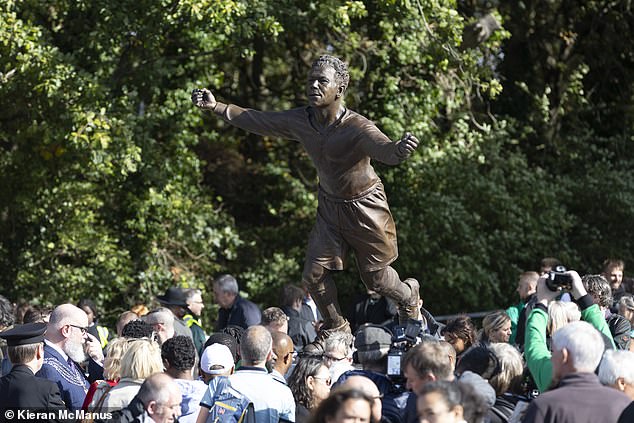
Jack Leslie’s three grand-daughters agreed the man himself might have frowned upon the delightful ceremony outside Home Park in Plymouth.
“We lived with Grandad in East Ham,” explained Lesley. “It was our family home with seven of us in the house, a bit packed sometimes but it was a fun, loving happy family and Grandad was the rock.
“There was a charisma about him. He drew people towards him and he was so humble he never talked about his football career. I don’t think he realised how great he was. We think if he could see us, he’d say, “What’s all this fuss about?”
“It wasn’t until Viv Anderson played for England and the Daily Mail did an interview with Grandad that people started talking about it, and he told us exactly what happened. When he told us, we knew that was what had happened. He wouldn’t have made up a story like that, and yet the number of times we spoke to people about it and you’d see them glaze over because they thought if he didn’t get the cap then it was because he wasn’t good enough. We knew that wasn’t the case.”
Jack Leslie is a Plymouth Argyle legend. Signed from Barking Town in 1921, he was an inside left who scored 137 goals in 400 appearances for the Devon club and forged a prolific partnership with left winger Sammy Black.
They won promotion and went on to achieve the joint-highest finish in their history, fourth in the second tier in 1931-32, a season when Leslie top-scored with 21 goals.
Yet there is more to his story. In fact, there is a place in this country’s footballing history because he was called up by England in 1925, only to be dropped when the selection committee realised he was black, his father born in Jamaica.
“All of a sudden everyone stopped talking about it,” Leslie told the Daily Mail’s Brian James in 1978, when Viv Anderson became the first black footballer to win a senior England cap. “Sort of went dead quiet. Didn’t look me in the eye.”
By this time, Leslie was working in the boot room at West Ham. He had run a pub in Truro, Cornwall, when his playing career ended before returning to his East London roots to work as a boilermaker.
When he retired, he joined the ground staff at Upton Park, stepping back into the football family but still too modest to talk about his own achievements as his grand-daughters Lesley, Lyn and Gill discovered during England’s 3-3 draw against Germany last month.
“We were talking to Sir Trevor Brooking,” said Lesley. “He knew Grandad when he worked at West Ham and seemed fond of him, but said Grandad never told him about the cap that was taken away.”
When Leslie died in 1988, at the age of 87, his true place in history was not widely known, and it remained obscured until a group of Plymouth supporters launched a campaign to create a statue in his honour.
The response was phenomenal. Argyle fans backed the crowd-funding project, raised the money in no time and the handsome bronze of Leslie by Andy Edwards was unveiled yesterday, standing 12-feet high on a granite plinth adorned with images of Leslie’s life and the tale of the cap that never was.
“A great day and a great event,” said Argyle’s chief executive Andrew Parkinson. “It has been a tireless campaign by our supporters to recognise Jack, who was a great player in his own right but it was also important to recognise his story because no decision should ever be made based upon the colour of a man’s skin. This day encapsulated everything: the story, the pioneering spirit of Jack and the power of football supporters in bringing something to life.”
The day brought more than 40 of Leslie’s descendants together, some of them meeting for the first time.
There were representatives from Barking and West Ham, a moving recital by spoken word artist Big Scoop, and hundreds of Argyle supporters, including 96-year-old Charlie Trevethan, who can recall skipping over the Home Park turnstiles to see Leslie and Black in full flow.
Perhaps most impressive of all, the campaign has forced the FA into action. Less than five years ago, they were adamant there was nothing they could do to acknowledge the treatment of Leslie almost a century before.
Nothing beyond a statement of regret from an FA spokesman issued to Sportsmail for an article about the campaign. This week, however, chair of the FA, Debbie Hewitt agreed that a posthumous cap would be honoured to Leslie.
It might have been nice had it come sooner, in time to be savoured by his only child Evelyn, who died in April, aged 94. But better late than never. And a perfect accompaniment on a day of tribute to one of English football’s great.
- A Daily Mail report











